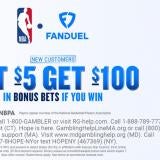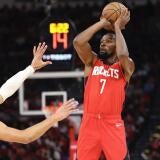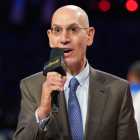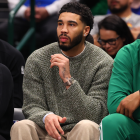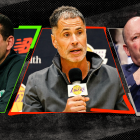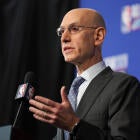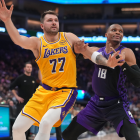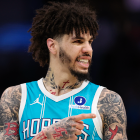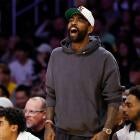NBA buyout market explained: How the rules have changed with the new CBA and what to expect in coming weeks
The NBA's buyout market is going to be very different this season
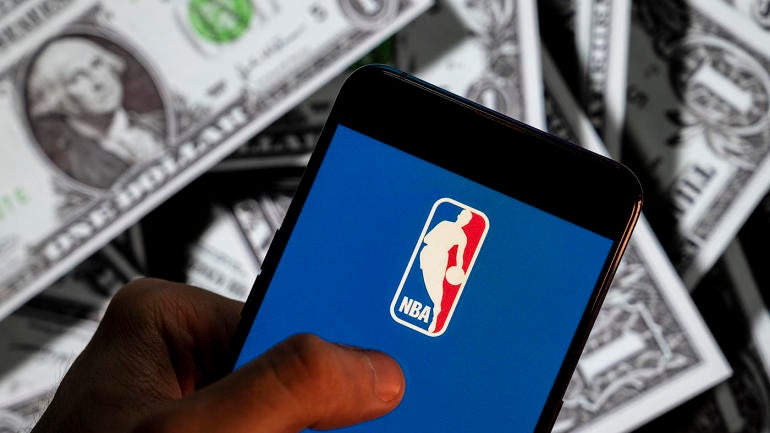
If the NBA trade deadline is dinner, the buyout market is dessert. It typically comes after the trade action has concluded, and in the grand scheme of things, it's often more important than the main course. In the all-in era, many contenders have lacked the assets to make meaningful in-season trades.
So instead, they wait for the dust to settle. A couple of older players with big, often expiring contracts find themselves dealt to bad teams or were just stuck there in the first place. Those teams agree to grant them free agency in exchange for a bit of cash back on the remainder of their deals, and those players get to land on the contender of their choice. They often wind up playing more prominent roles deep in the playoffs than their more valuable blockbuster counterparts.
Case-in-point: the Miami Heat started a buyout player for most of their Finals run last season in Kevin Love. The Nuggets got Reggie Jackson, and he is playing a significant bench role for them now. The Clippers even got Russell Westbrook through a buyout. And under 2024 rules, none of those signings would have been legal.
The NBA and NBPA agreed to a new collective bargaining agreement last season that created significant restrictions on how the NBA's most expensive teams could add talent. Most of those restrictions won't kick in until the 2024-25 season, but one significant change is already in effect. Starting this season, any team above the first luxury tax apron cannot sign a player who has been bought out during the season unless that player's former salary was below the non-taxpayer mid-level exception.
In English, please? Well, the luxury tax line this season is $165,294,000. Roughly $7 million above that figure is the first tax apron at $172,346,000. At present, there are eight teams whose total salary exceeds that figure: the Warriors, Clippers, Suns, Bucks, Celtics, Cavs, Nuggets and Heat. Those teams cannot sign any player who was waived during the season if his salary for that season, prior to being waived, was above $12,405,000, which is this season's non-taxpayer mid-level exception. Any team that makes it over the line through trades, or who are close enough to it that the signing itself would take them over the line, are also forbidden from signing these players. The only teams in any jeopardy of joining our first eight are the 76ers and Lakers.
This change might seem minor, but it completely upends our usual expectations for buyout season. Five of the top eight seeds are currently locked out of the market. So are three very desirable markets with minutes to offer in Miami, Phoenix and Golden State. That is going to open up doors on the buyout market that previously never existed. That's right, folks. The Minnesota Timberwolves are officially a buyout destination. Or, if you're more of a big-market absolutist, the Los Angeles Lakers suddenly lack competition for the best available talent.
So what can we expect out of the buyout market this February? For now, we're largely speculating. We don't know who's going to get traded and which veterans on losing teams will want to latch on with a possible winner. Expect some of the names we discuss below to stay put and other names we miss ultimately change hands. For the time being, however, these are the players to watch on the buyout market:
Gordon Hayward
If Gordon Hayward gets a buyout from the Hornets, he wouldn't just be the best player to earn a buyout in this cycle. He'd have a real argument for the title of "best buyout player ever." Even at 33, most of his per-minute numbers are more or less in line with his career averages. Despite his age, he is still rated as at least an average defender. The obvious drawback here is health. Hayward has dealt with a variety of maladies in the seven seasons since he left Utah, and right now is struggling through a calf injury.
Of course, moving to a contender could mitigate that risk slightly because he wouldn't be playing 32 minutes per game on most good teams. The version of Hayward that stays healthy and gives a winning team 18-to-20 solid bench minutes per night is still a very valuable player. It's just really rare for a high-level shot-creator to become available through mid-season free agency. When one does, like Westbrook last season, he typically comes with some sort of significant on-court drawback. For Westbrook, that was his 3-point shooting. Hayward's flaw is health. If he's on the court, he in no way hinders his team.
So where could he go? Minnesota is the perfect on-court fit. He already has some leftover chemistry with Rudy Gobert from their days in Utah, and they sorely need another offensive player for their bench. When Anthony Edwards rests, they fall off of a cliff offensively. Hayward could help on that front and play some minutes with Edwards as needed. The Lakers are another possibility here, depending on what they do at the trade deadline. Their No. 21-ranked offense could certainly use a boost, and the fanbase would probably love to give Darvin Ham a reason to play Taurean Prince fewer minutes. The Knicks looked into Hayward as a 2020 free agent. If they don't trade for their secondary ball-handler, signing Hayward to play that role would make sense. He might even be able to start there depending on when he gets back and how long Julius Randle sits out.
Healthy Hayward is good enough to potentially get traded. Teams like Oklahoma City with excess draft capital and plenty of movable salary should consider it. But his health just makes it so hard to believe that someone will pay real assets to get him. He could opt not to negotiate a buyout with the Hornets. Doing so would allow them to retain his Bird Rights and possibly re-sign him next season, but does that really make sense for a rebuilding team? Logically, Hayward should be bought out. We're just not used to seeing that happen for players of his caliber.
Kyle Lowry
Lowry has already been dealt once, and there's no good reason for the Hornets to keep him if they can't flip him again at the deadline. Lowry can still be a reasonably effective two-way guard in lighter minutes, and he proved that during Miami's Finals run last season. He probably shouldn't handle the ball as much as he did during his peak, but he can still make 3s and defend above his weight class. That's a recipe for a valuable playoff player.
Rumors have linked Lowry to his hometown 76ers for years now. Could this be the year he finally makes the jump? Maybe, but how many minutes do the Sixers have to offer? He'd definitely play in Furkan Korkmaz's place, but at full strength, that's not much. Does Philadelphia view him as an upgrade over Patrick Beverley? That's the big question here. He's not quite as good on defense, but he's a more reliable shooter and ball-handler.
The Lakers, Timberwolves and Knicks make sense for the same reasons they were possible Hayward fits. Here's a stealthier idea: Orlando. The Magic have a bunch of young guards who need minutes, but if they want to make it beyond the play-in round, having at least one veteran ball-handler who can shoot would probably serve them well.
P.J. Tucker
Tucker is to the expensive teams what Hayward is to everybody else. He doesn't quite clear the mid-level bar this season, so he's available to everyone. It's just a matter of whether or not he's getting a buyout. It probably won't come from the Clippers directly. Even if they'd like to save on their tax bill by waiving him, they'd probably prefer to avoid handing him to a competitor on a silver platter if they can avoid it. If Tucker hits the open market, it's probably because the Clippers made a deal at the deadline that required his salary.
The Bucks are watching this one closely. They obviously have quite a bit of familiarity with Tucker from their 2021 title run, and they badly need defense wherever they can find it. Boston would probably love him as well, especially given his potential to play some small-ball center and provide insurance against a Kristaps Porzingis injury. He spent several years with the Suns earlier in his career, and Phoenix needs defense even more than Milwaukee.
How much does he have left in the tank? The Clippers don't seem to think it's very much. He's shooting below 30% from 3-point range in limited minutes this season. That's a red flag as making corner 3s is basically all he does on offense. With the right offensive infrastructure, he could probably still help a defense. But the days of him playing 30 minutes against the best opposing scorer are probably over.
Delon Wright
Wright checks some of the same boxes as Tucker: a formerly fearsome defender with offensive limitations who hasn't done much this season but could be a valuable reserve in the right setting. Like Tucker, he should never, ever shoot inside of the arc, but he's grown into a decent 3-point shooter who can handle the ball a bit and make plays for teammates.
Wright would be a nice consolation prize for any of the Tucker teams. He could also bring a bit of ball-handling juice to teams struggling at backup guard spots. Minnesota makes a bit of sense in this regard, and he might be an upgrade on Davion Mitchell in Sacramento if he can recapture his older form in a better situation.
Joe Harris
Harris was cap dumped on Detroit in the offseason, and if his limited playing time for the Pistons has served as an audition for buyout season, he hasn't exactly earned a callback. Detroit desperately needs spacing wherever it can get it, but Harris has barely been able to find the floor. He's made 10 of his 29 3-point attempts. Not great, Bob!
Of course, it's not as though anyone else is making shots in Detroit this season. Harris' history of ankle injuries and playoff collapses is concerning, but shooting is a pretty easy skill to slot onto a new team. Virtually anyone with minutes available should consider bringing him in and seeing if he has anything left in the tank down the stretch in March and April. The Timberwolves, Lakers and Magic stand out among teams that want to win and need shooting. It might not hurt the Nets to offer him a reunion if they wind up trading away some of their wings at the deadline. He hasn't exactly proven he's ready to help a contender this season, but shooting is such a valuable skill that almost anybody could justify trying him out.


